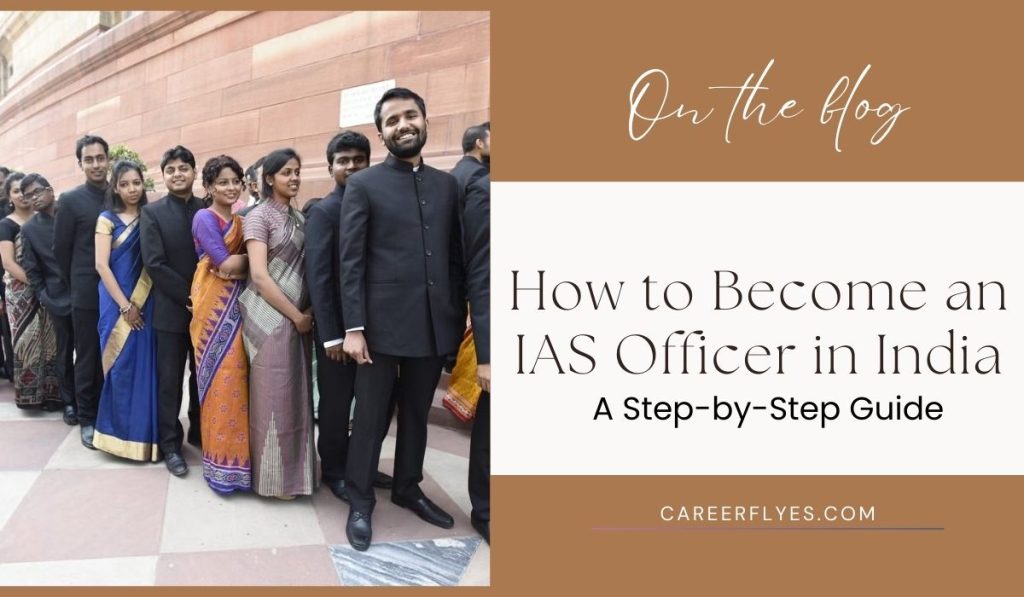How to Become an IAS Officer in India: A Step-by-Step Guide
6 min read
Becoming an Indian Administrative Service (IAS) officer is a dream for many. It is not just about the prestige that comes with the title, but also the ability to bring real change to society. But getting there requires dedication, patience, and a clear understanding of the steps involved. This guide will walk you through the entire process, so you know exactly what to expect on your journey to becoming an IAS officer.
Understanding the IAS Officer Role
An IAS officer holds one of the highest positions in the Indian bureaucracy. They manage key functions of the government, implement policies, and ensure that laws are followed. It is a career that demands strong leadership, problem-solving skills, and an unwavering sense of responsibility.
Eligibility Criteria for IAS
Before diving into the exam details, you must ensure that you meet the basic eligibility requirements:
| Criteria | Details |
|---|---|
| Nationality | Must be a citizen of India. |
| Age Limit | 21-32 years (general category), with relaxations for OBC, SC/ST, and differently-abled candidates. |
| Educational Qualification | Minimum qualification: A bachelor’s degree from a recognized university. |
| Number of Attempts | General: 6 attempts, OBC: 9 attempts, SC/ST: Unlimited (until the age limit). |
How to Become an IAS Officer in India
The Step-by-Step Process to Become an IAS Officer
Step 1: Meet the Eligibility Criteria
The first step is ensuring that you meet all the eligibility requirements—age, nationality, and educational qualifications. If you qualify, you are ready to apply for the UPSC Civil Services Examination (CSE).
Step 2: Applying for the UPSC Civil Services Exam
The UPSC Civil Services Examination is the gateway to becoming an IAS officer. Applications are released once a year on the UPSC website, and you will need to fill out the online form to register.
- When to Apply: The exam notification is usually out by February, and the last date to apply is typically in March.
- Application Fee: The fee varies by category (Rs. 100 for general candidates, free for SC/ST candidates).
Step 3: Understanding the UPSC Civil Services Exam Structure
The UPSC exam has three stages:
-
Preliminary Exam (Prelims):
- Two papers: General Studies Paper I and General Studies Paper II (CSAT).
- Paper I covers subjects like history, geography, and current affairs.
- Paper II tests comprehension, logical reasoning, and analytical skills.
- The Prelims is only qualifying—you need to clear this to move to the Mains.
-
Main Examination (Mains):
- Nine papers in total, including essay writing, general studies, and one optional subject.
- Unlike the Prelims, the Mains tests your in-depth knowledge and written communication skills.
- This is where you must showcase your ability to think critically, analyze situations, and articulate your thoughts effectively.
-
Personality Test/Interview:
- Candidates who clear the Mains are called for the Interview.
- The panel will assess your leadership qualities, decision-making ability, and personality traits.
Step 4: Preparing for the Exam
Becoming an IAS officer means you must prepare thoroughly for the UPSC exam. Here are some strategies:
- Study the Syllabus: Go through the UPSC syllabus carefully. The syllabus is vast and includes subjects like history, geography, polity, economics, and ethics.
- Choose Your Optional Subject: The optional subject holds significant weight in the Mains. Choose something that aligns with your strengths and interests.
- Study Resources: Start with NCERT textbooks for basics, and then move on to reference books and daily newspapers for current affairs.
- Practice Writing: The Mains require extensive writing, so practice answering questions in a structured and concise manner.
- Mock Tests: Regular mock tests help you manage your time, practice answering questions, and track your progress.
Step 5: Appear for the Preliminary Exam
The Preliminary Exam usually takes place in June. It is an objective-type test, and you need to qualify to proceed to the Mains. Keep in mind that Paper II is qualifying—you need to score at least 33%, while Paper I determines whether you move to the next stage.
Step 6: Appear for the Main Exam
The Main Exam is held in September or October. Here, you will be tested on nine different papers, including language, general studies, and your optional subject. The Mains are written in a descriptive format, so it’s crucial to practice writing essays and long-form answers.
Step 7: Attend the UPSC Interview
If you clear the Mains, you will be invited to the final stage—the UPSC interview, usually held in March or April. The interview tests your personality and ability to think on your feet. You may be asked about current affairs, ethical dilemmas, or hypothetical situations where you must showcase your problem-solving skills.
Step 8: Results and Training at LBSNAA
Once the interview is over, the final results are announced in May or June. If you are selected, you will undergo two years of training at the Lal Bahadur Shastri National Academy of Administration (LBSNAA). This training covers various aspects of governance, administration, and ethics, preparing you for your role as an IAS officer.
Preparation Tips for the UPSC Exam
| Preparation Area | Key Strategies |
|---|---|
| General Studies | Cover NCERTs, current affairs, and reference books. Focus on understanding concepts rather than rote memorization. |
| Optional Subject | Choose an optional subject that aligns with your interests and strengths. Study deeply as it carries significant weight in the Mains exam. |
| Essay Writing | Practice writing essays on a wide range of topics, improving your structure, argumentation, and clarity. |
| Answer Writing | Practice writing answers within a time limit to develop conciseness and precision. Include relevant examples and case studies in your answers. |
| Mock Tests | Appear for regular mock tests to gauge your preparation level and improve your time management skills. |
IAS Exam Strategy and Time Management
| Exam Stage | Strategy |
|---|---|
| Prelims | Focus on a wide range of topics. Time management is crucial—practice mock tests extensively. |
| Mains | Master answer writing skills, prioritize revision, and ensure you complete the entire syllabus. |
| Interview | Be confident, stay updated on current affairs, and prepare for both factual and opinion-based questions. |
Career Growth and Responsibilities of an IAS Officer
| Level | Responsibilities |
|---|---|
| District Level | Implementing government schemes, maintaining law and order, and managing public administration. |
| State Level | Policy implementation, handling budgets, disaster management, and supervising various administrative departments. |
| National Level | Advising ministers, formulating policies, and representing India at global platforms. |
Salary and Perks of an IAS Officer
| Component | Details |
|---|---|
| Basic Salary | Starting salary is around ₹56,100 per month. |
| Allowances | Includes house rent allowance, travel allowance, and dearness allowance. |
| Perks | Official vehicle, subsidized accommodation, medical benefits, and pension. |
Career Growth and Responsibilities of an IAS Officer
Once you become an IAS officer, your responsibilities will grow as you gain experience. You will start at the district level, managing the implementation of policies and maintaining law and order. As you progress, you may move to state or national-level positions, influencing policy decisions and even representing India on international platforms.
You may also want to explore other administrative roles such as how to become a District Magistrate or an IPS officer to compare career paths.
Challenges of Being an IAS Officer
Being an IAS officer is not just about the power and perks. It is a demanding job that comes with its share of challenges:
- Long Working Hours: You may have to work late nights, weekends, and holidays.
- Political Pressure: Balancing the expectations of politicians with public needs can be tough.
- Public Accountability: You are constantly under public scrutiny, and every decision you make can have far-reaching consequences.
Conclusion
Becoming an IAS officer is no small feat. It takes determination, hard work, and a deep desire to serve the country. However, for those willing to invest the time and effort, the rewards are immense. You have the power to make a meaningful difference in people’s lives and contribute to the development of the nation. Start today, and remember that every step brings you closer to your goal.






